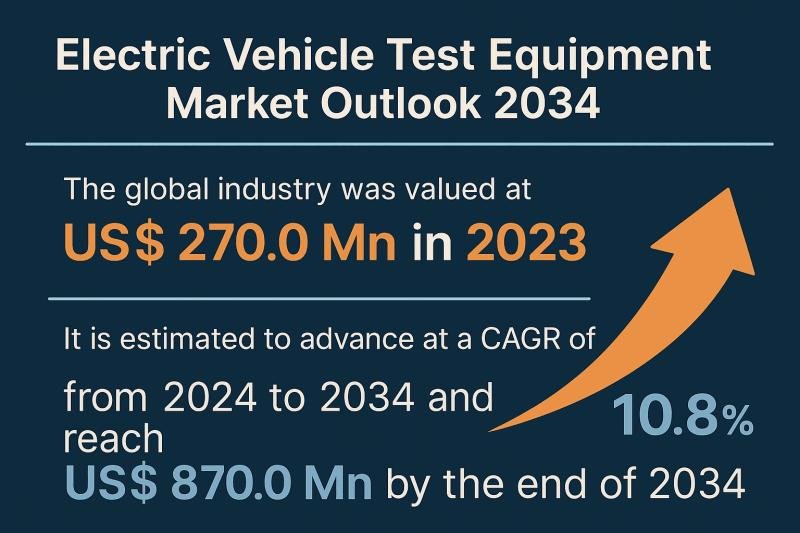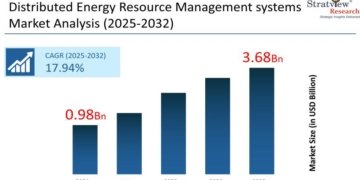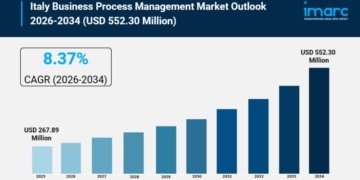The Electric Vehicle Test Equipment market is gaining momentum as EV production scales up and demand for performance validation rises. Valued at US$ 270.0 Million in 2023, the market is projected to grow at a robust CAGR of 10.8%, reaching US$ 870.0 Million by 2034. Growth is fueled by advancements in battery technologies and stricter safety and compliance standards.
Request Your Exclusive Sample Copy of this Market Report Today! https://www.transparencymarketresearch.com/sample/sample.php?flag=S&rep_id=86161
The Electric Vehicle (EV) Test Equipment Market is rapidly evolving as the global EV ecosystem accelerates toward mass adoption. Ensuring performance, safety, reliability, and compliance of EV components has become more critical than ever-placing EV testing tools at the core of electric mobility innovation.
From battery testing and electric drivetrain validation to charging equipment certification and power electronics inspection, test systems are becoming smarter, more modular, and AI-integrated to support fast-evolving EV technologies.
Industry Overview
Electric vehicle test equipment includes a range of tools and systems designed to evaluate the performance, durability, safety, and compliance of EV components and systems. These include battery packs, electric motors, inverters, power electronics, vehicle control units (VCUs), regenerative braking systems, and charging interfaces.
As EV production scales up, manufacturers and testing labs face growing pressure to validate a wide variety of configurations under diverse load conditions. Traditional automotive testing tools are no longer sufficient-hence the surge in demand for purpose-built, high-voltage-compatible EV test systems.
This market is driven by automakers, component suppliers, third-party labs, regulatory authorities, and research institutions all working to deliver EVs that are safe, efficient, and globally compliant.
Analysis of Key Players in the Electric Vehicle Test Equipment Market
As the electric vehicle (EV) industry rapidly evolves, companies in the EV test equipment market are focusing on innovation to meet the growing need for precision, speed, and adaptability. Leading manufacturers are developing high-current, high-precision test systems that outperform conventional equipment, helping OEMs and suppliers ensure performance, safety, and regulatory compliance for electric vehicles.
These companies are also advancing their testing solutions to support emerging EV technologies, including fast-charging systems, battery management systems (BMS), and autonomous driving features, while aligning with international testing and emission standards.
Prominent Players in the Global EV Test Equipment Market Include:
• ALL-TEST Pro, LLC
• Arbin Instruments
• AVL
• CALTEST Instruments
• Chen Tech Electric
• Chroma ATE Inc.
• DEKRA
• DENSO CORPORATION
• FEV Group GmbH
• HORIBA
• Intertek Group plc
• KUKA AG
• MAXEYE TECHNOLOGIES
• Microtest Corporation
• National Instruments Corp.
• Softing AG
• Teamtechnik GmbH
• TÜV Rheinland
These players are evaluated in the report based on their business segments, product portfolio, innovation strategies, recent developments, and financial performance.
Key Developments:
• HORIBA Europe GmbH (July 2021): Acquired BeXema GmbH, enabling integration of cutting-edge electric power technologies into HORIBA’s internal systems. This move enhances HORIBA’s capabilities in energy testing, particularly for EV powertrains and components.
• HORIBA (October 2020): Launched ADS EVO, an advanced driving robot designed for the testing of connected, autonomous, shared, and electric (CASE) vehicles. This automated testing system supports the latest emission standards, including post-Euro 6 regulations, and reflects the industry’s transition toward smart and compliant mobility solutions.
These strategic developments illustrate the commitment of key players to offer state-of-the-art testing solutions that support the future of electrified mobility while ensuring accuracy, safety, and global compliance.
Need a detailed market analysis? Contact us for custom reports and insights! https://www.transparencymarketresearch.com/sample/sample.php?flag=S&rep_id=86161
Key Growth Drivers
1. Global Surge in EV Production
The booming demand for electric vehicles is triggering a parallel rise in test equipment needed to validate each sub-system and ensure quality.
2. Evolving Battery Technology and Safety Standards
Frequent innovations in lithium-ion, solid-state, and sodium-ion batteries require dedicated test solutions to ensure thermal stability, lifecycle, and performance.
3. Stringent Global Regulations and Certification Requirements
EVs must comply with international standards like ISO, IEC, and UNECE regulations-necessitating thorough testing of emissions (non-tailpipe), electromagnetic compatibility, and system safety.
4. High-Voltage System Adoption
Modern EVs operate on 400V to 800V platforms, requiring next-generation test systems with advanced insulation and fail-safe mechanisms.
5. Integration of ADAS and Connectivity
Vehicle testing now includes control system validation, communication protocol testing (CAN, LIN, Ethernet), and cybersecurity assessments.
Opportunities in the Market
• Emergence of Fast Charging Standards (CCS, CHAdeMO, GB/T)
Testing equipment is needed to validate charging compatibility, communication integrity, and power delivery in real-time.
• Expansion of EV Test Centers in Developing Markets
As countries like India, Brazil, and Southeast Asian nations build domestic EV capacity, localized testing labs and portable test setups are in high demand.
• Use of AI and Simulation in Testing
AI-powered data analytics and digital twins are being used to predict failures, optimize testing cycles, and shorten development timelines.
• Rental and Subscription-Based Testing Services
Offering test equipment as a service (TaaS) is becoming popular among startups and small OEMs with limited infrastructure.
Industry Trends
• Rise of Modular and Multi-Device Testing Platforms
Flexible systems capable of testing multiple components-motors, inverters, and batteries-are gaining popularity to reduce CAPEX.
• Portable Test Equipment for Field Diagnostics
Lightweight, mobile testing units are supporting real-time monitoring and maintenance of EV fleets and charging stations.
• Integration of HIL (Hardware-in-the-Loop) and SIL (Software-in-the-Loop)
Virtual testing environments are reducing time-to-market and minimizing physical testing costs during early development stages.
• Cloud-Based Test Data Management
Centralized platforms allow remote test management, results analysis, and compliance documentation for global teams.
Market Segmentation
By Equipment Type:
• Battery Test Equipment
Evaluates charge/discharge cycles, thermal behavior, and degradation over time.
• Motor and Dynamometer Test Systems
Measures torque, speed, and motor efficiency under various loads.
• Inverter and Converter Test Equipment
Validates power conversion efficiency and system protection mechanisms.
• Charger Testing Equipment
Simulates real-world grid and vehicle-side charging conditions.
• EVSE (Charging Infrastructure) Testing Tools
Ensures protocol adherence, power quality, and network performance.
By Application:
• OEM and R&D Centers
Primary users for component testing and vehicle integration validation.
• Third-Party Testing Labs
Independent bodies offering pre-compliance and certification support.
• Universities and Research Institutes
Use advanced equipment for pilot studies and technology exploration.
Market Outlook and Future Prospects
The Electric Vehicle Test Equipment Market will play a critical role in the evolution of clean mobility, as the entire value chain transitions from ICE-based systems to complex, connected electric drivetrains. The market’s future lies in automation, digitalization, and AI-powered testing, allowing faster time-to-market and higher system reliability.
By 2034, over 80% of automotive OEMs are expected to implement fully digitized validation cycles, incorporating real-time analytics and predictive diagnostics. Furthermore, cybersecurity and V2X communication testing will become standard protocols for compliance.
In parallel, startups and Tier 2 suppliers will increasingly rely on shared or on-demand testing facilities, creating new business models in the test-as-a-service domain.
Investment Opportunities
• Expansion of EV Testing Labs in Asia-Pacific
Governments in India, China, and ASEAN are investing in public-private test labs-an opportunity for infrastructure suppliers and investors.
• AI and Simulation-Based Testing Software
Startups offering real-time simulation environments and cloud-integrated analytics platforms are attracting global funding.
• Battery Test Equipment Startups
As battery chemistries evolve, companies developing flexible and AI-driven battery test systems are seeing strong demand.
• Test Equipment Leasing Models for Emerging OEMs
Investors can support scalable rental platforms for testing tools, targeting budget-conscious EV startups.
Unlock Exclusive Market Insights & Strategic Opportunities! Get the latest trends, forecasts, and competitive analysis – Buy Now! https://www.transparencymarketresearch.com/checkout.php?rep_id=86161<ype=S
Why This Market Report Matters
This report offers a comprehensive and strategic view of the Electric Vehicle Test Equipment Market, analyzing its technological evolution, competitive dynamics, regulatory frameworks, and investment trends. Whether you are an automotive OEM, investor, policy planner, or tech innovator, this report equips you with actionable insights into one of the most mission-critical enablers of the electric mobility revolution.
Ensuring reliable, compliant, and safe EVs starts with testing-this market is the bedrock of electric vehicle quality assurance.
More Trending Research Reports-
• Car Leasing Market – https://www.transparencymarketresearch.com/car-leasing-market.html
• Automotive Exhaustive System Market – https://www.transparencymarketresearch.com/automotive-exhaustive-system-market.html
• Agricultural Trailer Market – https://www.transparencymarketresearch.com/agricultural-trailer-market.html
• Winter Tire Market – https://www.transparencymarketresearch.com/winter-tire-market.html
About Us Transparency Market Research
Transparency Market Research, a global market research company registered at Wilmington, Delaware, United States, provides custom research and consulting services. The firm scrutinizes factors shaping the dynamics of demand in various markets. The insights and perspectives on the markets evaluate opportunities in various segments. The opportunities in the segments based on source, application, demographics, sales channel, and end-use are analysed, which will determine growth in the markets over the next decade.
Our exclusive blend of quantitative forecasting and trends analysis provides forward-looking insights for thousands of decision-makers, made possible by experienced teams of Analysts, Researchers, and Consultants. The proprietary data sources and various tools & techniques we use always reflect the latest trends and information. With a broad research and analysis capability, Transparency Market Research employs rigorous primary and secondary research techniques in all of its business reports.
Contact Us
Transparency Market Research Inc.
CORPORATE HEADQUARTER DOWNTOWN,
1000 N. West Street,
Suite 1200, Wilmington, Delaware 19801 USA
Tel: +1-518-618-1030
USA – Canada Toll Free: 866-552-3453
Website: https://www.transparencymarketresearch.com
Blog: https://tmrblog.com
Email: sales@transparencymarketresearch.com
This release was published on openPR.



















